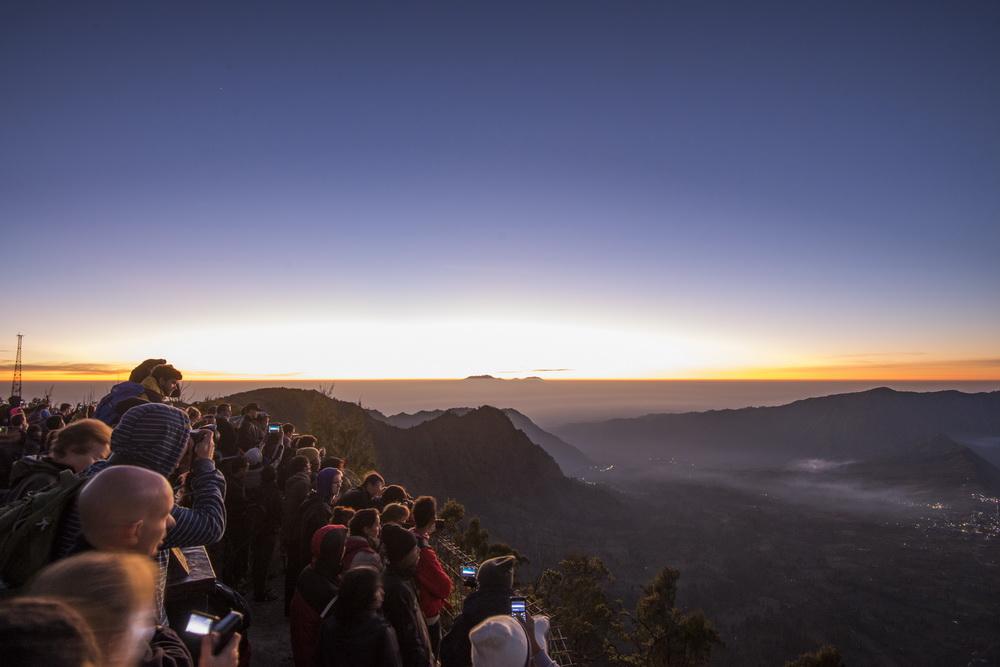Tourism sector supports people's revenue and national economy
• 02 Dec 2016

Wisatawan sedang melihat Taman Nasional Bromo, Tengger, Semeru, Jawa Timur. (Bareksa/Alfin Tofler)
The number of international tourists is expected to grow to 20 million in 2019
Bareksa.com - Tourism has become one of the largest and strongest industries in the world. This sector is the biggest contributor revenue and economic growth.
Tourism activities have now become the part of life, from urban society until people in rural area. These activities could encourage the economic growth locally and nationally.
Based on that, it is not surprise why Jakarta keep promoting this sector. Indonesian President Joko Widodo (Jokowi) said Indonesian tourism have a huge potential to attract international tourists. The growth of this sector can be increased by organizing more tourism events.
He said that tourist destinations in Indonesia and the diversity of its cultures have a tremendous potential economic. Local tourism could be promising even though this has not been optimized.
Indonesia’s promising tourism will create a positive multiplier effect in economy. Therefore, President Jokowi said we must have a strategy to make the tourism sector much better by taking actions. It also needs supporting factors, such as route flight, infrastructure and creating much more tourism events.
A research revealed eight reasons why tourism should be developed. According to International Union of Official Travel Organization (IUOTO), the first reason is tourism as a trigger for economy growth nationally or internationally.
Second, tourism can create the prosperity because there will be lots of improvements in communication sector, transportation, accommodation and service. Third, tourism is a trigger for culture conserve and social values to be more commercial. Four, tourism is a hope for equalization welfare.
Five, tourism might raise the foreign exchange. Six, this sector is a stimulus for international trade. Seven, this can trigger the development of tourism school and courses that can build the atmosphere of hospitality. Last, tourism might increase the market of local product.
Tourism Target
Tourism has an important role in economy growth and for that Jakarta keeps encouraging this sector and set several targets have to be achieved. One of those targets is rising domestic gross income from 4,2 percent in 2014 to 8 percent by 2019, according to state website, presidenri.go.id.
The number of international tourists visited to Indonesia in 2014 was 9 million and it is expected to grow in 2019 to 20 million. The foreign exchange from this sector is hoped to increase from 120 trillion rupiah in 2014 to 240 trillion rupiah in five year.
Another target in tourism sector are raising the participation of small medium enterprises in this industry and increasing the local qualified officers. Referring to that, the development of tourism industry will focus on pushing the involvement of local business, increasing diversity, making local product more competitive and providing tourism service in every tourism destinations.
Those targets will be implemented by involving local people in developing tourism business, giving the investment facility, including raising the skill of local people in tourism sector.
Increasing Tourism Investment
Indonesian Investment Coordinating Board has been persistently support activities in domestic investment and foreign capital investment, including developing the tourism industry. Chairman of Investment Coordinating Board, Thomas Lembong, said investment in tourism sector needed to be improved and the distribution investment should not only focus in Bali and Jakarta.
“We have been starting diversification the investment outside Bali and Jakarta by announcing new program:10 Bali Baru (New Balis). In order to hit the target, we need contribution from private investors up to trillion rupiah,” Lembong said.
The 10 Bali Baru are tourism destinations that now the investment priority of the government. Tourism destinations in 10 Bali Baru are Lake Toba in North Sumatera province, Bangka Belitong, Tanjung Lesung in Banten province, thousand islands in central Jakarta, Borobudur temple in Central Java province, Mandalika in Lombok, Komodo Island in Nusa Tenggara Timur province, National Park Wakatobi in Southeast Sulawesi, and Morotai in North Maluku.